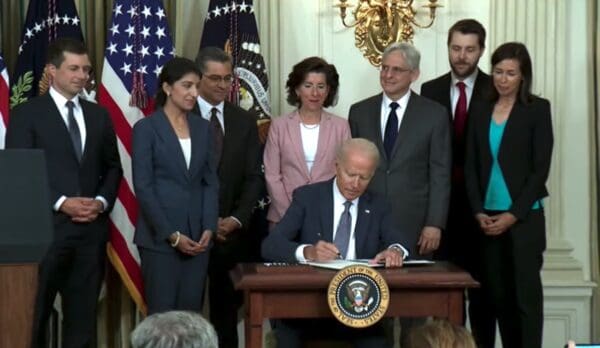As anticipated, the Biden Administration has issued an Executive Order that is said to promote competition in the US economy. The order is extensive and includes a list of 72 areas where Joe Biden seeks to change. Included in the list is net neutrality, actions seeking to reduce the “trend of corporate consolidation,” prescription drug pricing, occupational licensing, hearing aids, and much more.
The Executive Order also encourages antitrust agencies to “focus enforcement efforts on problems in key markets and coordinates other agencies’ ongoing response to corporate consolidation.”
A new entity called the White House Competition Council, led by the Director of the National Economic Council will be launched to monitor progress on finalizing the initiatives in the Order.
Big tech gets special attention as the White House believes that more scrutiny is needed regarding “mergers, especially by dominant internet platforms, with particular attention to the acquisition of nascent competitors, serial mergers, the accumulation of data, competition by “free” products, and the effect on user privacy.”
Regarding financial services, the Executive Order worries about consolidation in the banking sector stating:
“Over the past two decades, the United States has lost 70% of the banks it once had, with around 10,000 bank closures. Communities of color are disproportionately affected, with 25% of all rural closures in majority-minority census tracts. Many of these closures are the product of mergers and acquisitions. Though subject to federal review, federal agencies have not formally denied a bank merger application in more than 15 years. Excessive consolidation raises costs for consumers, restricts credit for small businesses, and harms low-income communities. Branch closures can reduce the amount of small business lending by about 10% and leads to higher interest rates. Even where a customer has multiple options, it is hard to switch banks partly because customers cannot easily take their financial transaction history data to a new bank. That increases the cost of the new bank extending you credit.”
There is no mention of the rise of Fintechs which compete with banks that may be able to provide superior financial services, at a lower cost, to both consumers and businesses. In fact, recent policy moves have sought to stem Fintechs from providing services – like allowing Fintechs to receive national bank charters and the about-face on the true lender rule.
The Executive order does seek to make it easier for consumers to take their financial transaction history data to a new bank when they change providers.
So does this Executive Order improve completion for consumers and SMEs? When it comes to Fintech and innovation in financial services – not so much. The tenor of the Biden Administration has not been very supportive when it comes to challenger banks, online lending, and other areas where competition could drive costs lower. While there may be some aspects in the EO that can improve areas of the economy, there is little about reducing regulatory barriers that impede businesses and nothing about lowering taxes that can boost private investment.
The Small Business & Entrepreneurship Council (SBE Council) has issued a response to the “sweeping regulatory drive across the federal government” as outlined by the White House. SBE Council states that:
“[The] Biden EO will greatly harm competition and economic vibrancy. Not promote it. [The] government-wide edict advances government control, not competition.
Raymond Keating, SBE Council chief economist, called the Executive Order “strange.”
“First, competition is alive and well in our economy, and ironically, it only suffers when government chooses to impose onerous tax and regulatory burdens on entrepreneurs, businesses and investors, as is the case with efforts from this same Biden administration. And thanks to an economy that promotes competition and innovation, consumers are enjoying a vast array of products, more innovation, and lower prices,” says Keating. “Second, the U.S. economy overwhelmingly is a small business economy. Consider that, according to the latest Census Bureau data, there are more than 32 million businesses in America, and 98 percent have fewer than 20 employees. Meanwhile, there are only a little over 20,000 that have 500 or more employees. Our economy is brimming with opportunity for entrepreneurs and small businesses across all industries, again, as long as government doesn’t inflict unnecessary burdens.”
Keating adds that big business does not equate some kind of negative. Large businesses, typically start as small businesses:
“That is the case with all of the industries being targeted for hyper-regulation and government controls via this executive order, including pharmaceutical; technology like broadband providers and social media; manufacturing; transportation like freight railroads; financial; and health care businesses. Large businesses became large by serving consumers well in the marketplace. One would think that a U.S. presidential administration would celebrate such leading companies, often global leaders, but instead, the Biden administration chooses to attack them,” Keating explains. “Fourth, small businesses are partners with and customers of large businesses, such as, for example, Amazon.com and Facebook, and when the government decides to interfere with how such companies do business – like dictating their business models and operations, and overruling the decisions made by consumers in the marketplace – small businesses suffer right along with the large firms. Likewise, employees at such firms and those seeking work wind up being hurt.”
Keating labels the White House’s move as a “bizarre declaration against American businesses.” He believes the actions as outlined in the Executive Order may be harmful, especially due to the fact the economy continues to recover from the COVID-19 health crisis.
“It certainly is not based on economics,” says Keating. “Instead, it has the whiff of radical politics. Again, it’s an especially bizarre time to engage in such attacks given that the U.S. economy is struggling to recover from the pandemic, and we need robust entrepreneurship, investment and business growth and hiring to get back on a path of economic growth that will truly help all Americans.”
 Karen Kerrigan, SBE Council president & CEO, says the recent downward trend in opportunity is a result of bad government policy such as tax and regulatory barriers. The few good ideas are drowned out by a “whole range of backward-thinking actions that work to intensify government control over entire industries.”
Karen Kerrigan, SBE Council president & CEO, says the recent downward trend in opportunity is a result of bad government policy such as tax and regulatory barriers. The few good ideas are drowned out by a “whole range of backward-thinking actions that work to intensify government control over entire industries.”
“This executive order is a recipe for economic decline and stagnation, and less entrepreneurship, opportunity and innovation. Our global competitors are having a very good day today.”
In brief, while competition is good, labeling policy as improving competition does not necessarily make it so.


